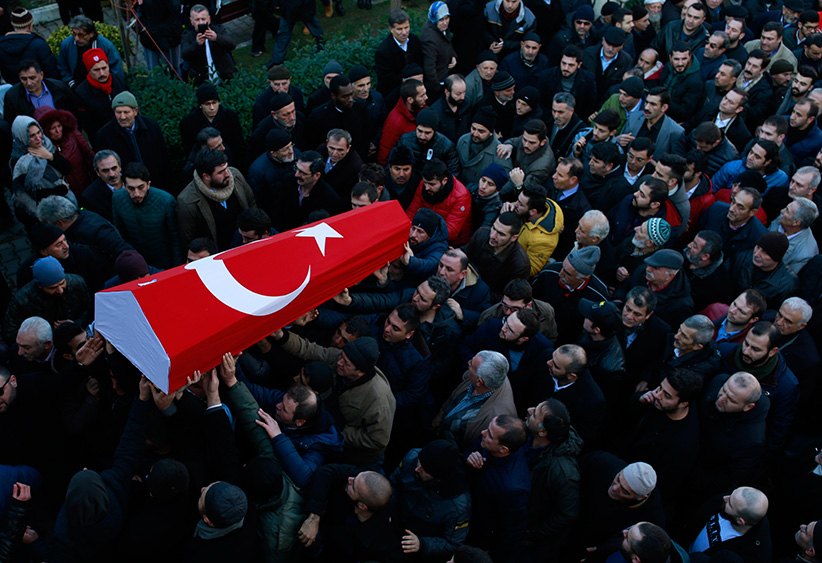Why terrorists are attacking Turkey
The country’s own ruling party helped enable radicals. Why this may be the year it finally confronts the enemy within.
Mourners carry the Turkish flag-draped coffin of Yunus Gormek, 23, one of the victims of the attack at a nightclub on New Year’s Day, during the funeral in Istanbul, Monday, Jan. 2, 2017. An assailant armed with a long-barrelled weapon, opened fire at the nightclub in Istanbul’s Ortakoy district during New Year’s celebrations, killing dozens of people and wounding many others. (Emrah Gurel/AP/CP)
Share

In an attack as horrendous as the one that engulfed the Reina nightclub in Istanbul on New Year’s, it’s easy to find fault and condemn a Turkish government that has overstepped all bounds of democratic process, to blame a leader who has, perhaps unwittingly, allowed the most fervent ideologues in society to feel their time has come.
The attack on Reina, now increasingly looking like it was carried out by a trained Islamic State militant backed by a network of operatives in Turkey, was a symptom of an increasingly fractured society divided into armed camps. The 39 dead, including one Canadian woman, were only seeking out celebration on a night meant to put the horrors of 2016 behind them.
But if there is some hope, then it is in this line from Turkish President Recep Tayyip Erdogan: “No one’s lifestyle in Turkey is under a systematic threat. The aim was clear—to create a fissure and polarize society. We will stand tall and keep our sangfroid.”
The cynics will roll their eyes, of course. “Who is Erdogan to argue for unity?” they will say. This is the same man who has overseen the arrest of tens of thousands since a violent coup attempt last July, including journalists, opposition politicians, academics and secular human rights activists, some of whom are accused of slights against Turkey’s leaders that would, in most Western nations, be categorized as legitimate criticism.
Related: Vladimir Putin’s grim win
They will also argue that it was the policies of Erdogan’s ruling AK Party that sowed the seeds of the jihadist violence Turkey is now experiencing. It was the AK Party, they will say, that allowed millions of undocumented dollars to pour into Turkey from the Gulf States and Saudi Arabia during the economic boom of the mid-2000s, feeding a growing cadre of ultra-orthodox Salafi preachers and pumping money into publishing houses devoted to translating Arabic texts based on Saudi Arabia’s brand of ultra-orthodox Islam into Turkish. It was these centres of radicalism, according to researchers like Andrew Hammond, an Oxford University expert on Salafi discourse in Turkey, that energized a latent Salafi trend in Turkey, bringing an abhorrent and deviant version of Islam into the mainstream.
The AK Party then strengthened their position by paving a yellow brick road through Turkey to Syria for foreign jihadists fighting the Syrian regime. By the late summer of 2014, Turkey’s radicals were feeling so emboldened that they began openly demonstrating in Istanbul against U.S.-led airstrikes against Jabhat al Nusra, al-Qaeda’s Syrian affiliate.
Related: Turkey just got its way. Again.
It’s these voices that now dominate Turkey’s religious narrative, in some cases backed by the government’s own Directorate of Religious Affairs which, fewer than 36 hours before the attack on Reina, ordered imams throughout the country to read out a speech at Friday prayers penned by its officials that condemned New Year’s celebrations as “illegitimate.”
These same voices took to the airwaves following the Reina attack and declared: “We are against New Year. We are against drinking alcohol and celebrations. Whoever wants to blow up whatever place may do so.”
The cynics will point to all of this and say the AK Party gave radicals the keys to the nation. Erdogan’s call for unity is at best too little, too late and at worst, just another ploy to retain power. But what if they are wrong? What if the Turkish president and his ruling AK Party are finally beginning to realize that Turkey faces its most dangerous threat inside its own gates?
If so, then Turkish authorities have a difficult 2017 ahead of them. The same people who enable terrorists are also some of the AK Party’s most fervent supporters. They feel powerful because they now believe they have a champion in Erdogan. They openly call for sharia law and demand an end to the “Western scourge” of secularism. They speak the language of ISIS and al-Qaeda but place Erdogan at the vanguard of an Islamic awakening in Turkey.
“Osama bin Laden realized Muslims are not ready for a caliphate,” the manager of one Salafi publishing house in Istanbul told Maclean’s in August last year. “So instead of establishing one, he focused on freeing Muslims from oppressive regimes. Turkey is at an early stage of its Islamic transformation. It’s not ready for sharia. Before there can be sharia, you need to prepare people for it. That is Erdogan’s job.”
Erdogan must reject these people. His government, if it is to keep its promise of representing all Turks, must take aim at a segment of society so thoroughly governed by ideological fervour that it believes anyone who is not with it is against it. But at the same time, the AK Party faces a quandary: cracking down on the radicals in its midst not only invites more attacks but will potentially alienate an important voting block.
That is the risk. That is why Turkey’s leaders must “stand tall.”